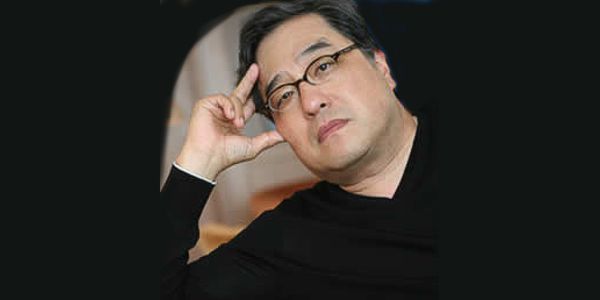
Talking to Director Ronny Yu, FEARLESS director, is just like talking to any film buff. He’s quick to laugh, and he exudes his love for movies with every comment. Yu is one of a few directors who broke into Hollywood in the late 90’s when Hong Kong was returned to China. But unlike many other directors, Yu fell into filmmaking by happenstance. A friend asked him to direct a personal project titled THE SERVANT (1979), and it became a surprise hit – No.1 in the box office that summer. Since then, Yu has directed nearly two dozen films, including Brandon Lee’s first movie, LEGACY OF RAGE (1986), as well as the critically-acclaimed films THE BRIDE WITH WHITE HAIR (1993) and PHANTOM LOVER (1995). He burst into Hollywood with the eclectic WARRIORS OF VIRTUE (1997), which featured kung fu kangaroos, and then struck gold, or perhaps blood, in the horror genre by reviving three stagnating franchises in two movies. BRIDE OF CHUCKY (1998) was the fourth of the five-film Chucky series and the highest grossing installment after the initial film. FREDDY VS. JASON (2003) merged the eight-film Nightmare on Elm Street franchise and the eleven-film Friday the 13th franchise. FVJ’s box office earnings bested all the previous films in both franchises, doubling the take of most of its predecessors. It also signaled the rebirth of the “versus” genre, long dormant since the days of KING KONG VS. GODZILLA. ALIEN VS. PREDATOR coattailed on the success of FVJ the following year, and more are in production. We caught up with Ronny Yu in China for this exclusive interview in which he discusses FEARLESS.
GC: After working in American horror, how was it to return to kung fu movies?
RY: It’s the first time that I actually do a traditional sort of genre. The ones that I’ve in Hong Kong before, it’s all like fantasy, like THE BRIDE WITH WHITE HAIR, a totally fantasy movie. It’s not really like martial arts. It doesn’t represent real Chinese martial arts.
GC: How do you distinguish between those movies and “real” martial arts films?
RY: I think the distinction is the star. Because this time around, I have a star actor that really is a master of Chinese wushu. Before I have (had) stars which are actors who didn’t know anything about martial arts.
GC: But you worked with Brandon Lee and Bolo Yeung. They were martial artists.
RY: Yeah. I consider them action stars because “kung fu” means “time” and “effort” in Chinese language. You know what the word “kung fu” means. Unless you put enough time Jet Li in Fearlessin your practicing, you will never achieve the level that people feel that you are a kung fu guy. You know what I mean? Jet Li has been doing it for years and he has some philosophy about martial arts. Somebody can just say “I can do a counter,” “I can do this,” “I can learn that,” you know? Imitating this, imitating that. Jet Li is someone that understands martial arts and what is there and what is the true meaning behind martial arts. It’s not just a form. It’s body, mind and spirit. And that is the theme of FEARLESS. It’s really about Chinese martial arts – the truth behind it. It’s not just how good a fighter you are. The character in Chinese – wu – if split it up, actually it’s called “avert conflict.” The better master you are, the better peacemaker you are because you can stop people from hurting each other. You can avert conflict because you are so good. So that is the whole theme that we’re looking for.
GC: I talked to Jet Li and he said something very similar. I don’t think America makes these distinctions.
RY: I think partly the responsibility lies on the Chinese filmmaker. I don’t think even Chinese people make that distinction themselves. I don’t think they even care about distinguishing, (or) making it play to the western audience or international audience.
There’s a huge difference between a wuxia. Wuxia is all about legendary, mythical characters. It’s not real. Wuxia is like you can fly. You can jump. CROUCHING TIGER is totally a wuxia picture. BRIDE WITH WHITE HAIR – totally wuxia. It’s not reality based. In the old days when they wrote those wuxia, they want to make it larger than life – bigger than life for the heroes – so they can do anything. They can jump off roofs. They can fly from roof to roof like in FLYING DAGGERS or HERO. Those are wuxia.
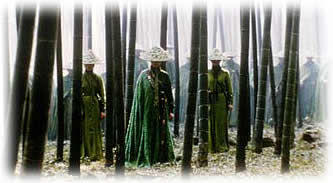
But when you talk about real martial arts movies, you talk about in the ’50s in China and Hong Kong. You know those WONG FEI HUNG. It’s all about hand-to-hand combat, weapon-weapon combat, really reality-based. If you go back to the ’50s, every one of those martial arts movies or wuxia movies have a very strong theme behind it. It always has a positive message. Bad guys never win. I remember when I was a kid, looking back at all those ’50s movies, and just realized that I always had that message – the good guy, did he do good? The right thing? He will have a good result, good consequences. The moral message is very clear.
If you can make a genuine martial arts movie, you need the star or the actor who can perform that, you know? Slowly, we don’t have that much. There’s only one Bruce Lee. There’s only one Jet Li. Even Jackie Chan is not. Jackie Chan is more acrobatic. Sammo Hung, same thing. So when you look down the list, you say, “Oh my God, how many movies can I make?” Then you land into the wuxia, which is using wires, fly people around. It does give a fantastic spectacle. It seems that the western audience doesn’t really care or they really don’t want to try and distinguish. They just go, “hey! That looks cool! He’s flying around.” So with this time around, with the chance to work with Jet and really do a reality-based movie, for me it’s a once-in-a-lifetime thing.
GC: How do you think growing up with polio might have affected how you portray martial arts in film?
RY: I have a lot of fantasies. I have a lot of imagination. I had polio when I was eight months old. That means I didn’t even know how to walk. So the moment I learned how to walk, I don’t know what is the normal way – how does it feel to walk without the limping. That’s why when I grew up, my father took me all those action movies and martial arts movies. So in my mind, I have this huge imaginative world, that what if Ronny Yu can kick ass? What if Ronny Yu has normal feet? So that imaginative world for me is always in the back of my mind.
I just feel there’s still a lot of rage, or anger, inside of me. Doing all the action movies, doing all the horror movies, it’s therapy for me. I can sort of release whatever’s inside of me. I don’t know. I’m sure every movie a director makes has something of his character or whatever, his personality in it. And that’s why in this movie, the restaurant scene – when I was discussing with Jet and Yuan Woo Ping, I said, “I feel that rage. This has no purpose – these two martial artists just want to kill each other for the wrong reasons.” That is some sort of message that hopefully the audience can get. The whole reason they have this life-and-death fight is really silly. My direction to Yuen Woo Ping is really destruction. It’s two men trying to destroy each other. I want that intensity out. I get high when I’m watching all this destruction. That’s what my wife is saying, “Subconsciously, you still have that anger in you. (laughs) That’s why you have that sort-of-like-smile on your face.”
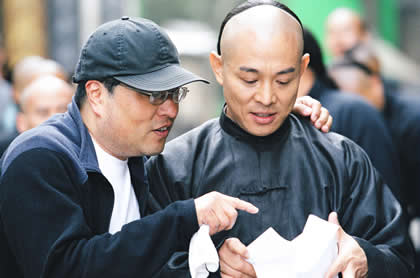
GC: Jet has said many times that FEARLESS is a highly personal film. Was it the same for you?
RY: Any movie a director makes – there’s some sort of personal thing, I think. For Jet, it’s on another level; but for me, this is a message that I want to convey too. When Jet talked to me about this project like eighteen months ago, he told me about what he’d heard from Chinese newspapers. Almost every year, there’s hundreds of thousands of kids, young teenagers, jumping off buildings and committing suicide. And he felt that he needed to convey a positive message. Failure is fake. It’s normal. It’s no big deal. You just need to be strong inside and get over that and then go on. There’s a lot more things in life than losing your girlfriend or losing your scholarship or whatever – get scolded by your family or your parents – there’s a lot more to life than that. It’s the same thing to me. It’s personal because I had polio and I have this anger in me. I’m sure there’s a lot of people that feel like they’re handicapped, not by physical but by mental. I’m using that. I’m using that handicap as a motivation, as something that moves me, to push me.
When I was young, I was really an inward kind of person. I was shy. I didn’t want to talk to people. I feel scared to talk to people because I don’t want them to realize that I have that condition. I’m afraid to talk to people because I don’t want to get in a conversation where the other guy starts to get up and walk and I have to follow him to continue the conversation and I’ll show my physical condition. But being the director, you have to push yourself. You have to walk around and do all the physical things – go up and down, up and down – and you have to talk to thousands of people. That sort of like pushed me to do things I’m dreaming of doing. I love movies. I want this. I want this. I want to make movies, to entertain, but at the same time, put out a good message. It’s because I love martial arts movies because it’s something for me to escape in. I’ll never forget it – I’ll never get to that world, but I can imagine. I can put myself in there. That’s why I love watching all those different styles of martial arts like wing chun and blah blah blah. It helped me. I can go to that world as my world.
GC: Have you ever practiced any martial arts?
RY: That’s funny. You know, I did. I did for a short time because when I was in school in England, we all hang out in London. We all hang out in the Chinese restaurant and that was the Bruce Lee era. Bruce Lee films elevated every Chinaman. So we all dressed like Bruce Lee. We all had these like Chinese kung fu uniform. And on the weekend, we go out and hang at the Chinese restaurant and we befriended one of the staff that cooked behind the kitchen. We all got free meals. And this guy was actually a wing chun guy, practicing for like 30-40 years, you know? He saw me. He saw my condition. And he said, “Hey, you know what? You can learn martial arts. Do like this.” Come on. How can I even stand straight? He said, “No, no, no, no, no, I’m going to teach you wing chun because wing chun is all about the hands. You need something to defend yourself. If you get in a situation, then you can do that. And also you are Chinese. You got to know some kung fu!” (laughs) That’s sort of like, you know, when you’re young, you say “Yeah, yeah, yeah.” But still, it’s difficult for me to follow through with the movement. But it felt good. Learn a little bit of movement, hand movement, a little bit of defense, technique, you know?
GC: Given the suicide theme, I want to touch on the star of BRIDE WITH WHITE HAIR and PHANTOM LOVER, Leslie Cheung. Did his death affect your approach to FEARLESS?
RY: Oh yeah, I mean, he and I – such a buddy. I was so shocked when this whole thing happened. I got a call and it was April 1st and I thought, “Come on.” It was a prank. It was April 1st – you know, April Fool’s day. But later I realized it’s not. It’s real. For me, I thought Leslie was a very strong person. I remember working with him. Every time we get into difficulties, he was the one who came to me and said, “Listen, it’s no big deal. We can get over this. We just need to sit down, think it out. No problem. No problem.” He said, “No problem cannot be solved.” And then all of a sudden he would jump off the roof of a building to end his life. For me, it’s like, you have to really be strong inside. All the fronts that you put up – it doesn’t mean anything. I think that is why the theme in FEARLESS – be strong, be strong – is so important. I’m sure there must be problems that Leslie was facing, but I’m sure it can be ironed out. It can be solved. It’s just sad because there’s some weakness in every one of us. We have to deal with so many things like pride, ego, everything, you know?
But I just hope that young people appreciate the message that we are putting out in FEARLESS. Be strong. Don’t worry about mistakes. Don’t worry about what other people think about you. I remember there’s one line that I loved so much in the movie before Huo Yuan Jia died. He said, “One cannot control how you come into this world, but one can definitely control how you get out.” I think that is a very powerful and inspiring line.
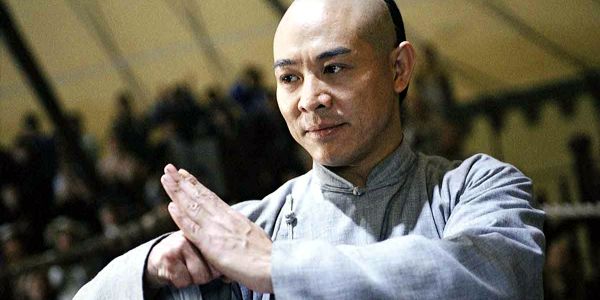
GC: In some ways, I think you’ve lived the fantasy of every filmgoer. You went straight to making films without going to film school. You got there by just being a fan of film. How do you think that might set you apart from other filmmakers today?
RY: Um, hmm. Good question. Never thought of it.
I think I’m more objective, because I don’t have all this baggage on me. If you go through film school, it felt like you need to achieve a lot of things artistically, you know? Unless you’re making art house movies, the moment you decide to be a mainstream filmmaker, that means you have to think like the audience. That’s how I approach every movie. I approach every movie thinking of Ronny Yu as the audience, not Ronnie Yu the artist or whatever. I try to have a very objective mind when I decide my choices. But of course, people will criticize me of being too objective, not enough artistic consistency. I know some of my peers; they would die to fight for something they think is artistically satisfying. But for me, I think it’s most satisfying when the audience is entertained. And on top of it, you sort of subliminally inject a message that you want them to realize, rather than preaching to them. Maybe – I’m just speculating – that’s why I’m a little bit different. Because all along, all through the twenty-some year I’ve been making movies, I’ve always been doing my own thing. I don’t want to hang out with a specific group of people – the filmmakers. I don’t hang out with film people. I just go to the movies, go to cinemas. That’s how I learn.
GC: Most of your fans cite BRIDE WITH WHITE HAIR as their favorite, but I must say I really enjoyed WARRIORS OF VIRTUE.
RY: Nobody’s seen it! (laughs)
GC: I always felt it was under the shadow of TEENAGE MUTANT NINJA TURTLES, where the heroes were so clown-like. I thought your kung fu kangaroos were quite noble.
RY: I think WARRIORS OF VIRTUE was a very difficult movie to market. You don’t know what kind of movie this is. Should they market it to the kids or should they market to teenage boys or should they market to adults? I think that is the problem with that movie. It’s an inherent problem.
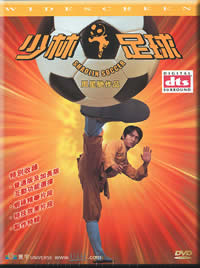
GC: Do you think marketing is a pervasive problem for Asian filmmakers? Look at what happened to SHAOLIN SOCCER and THE PROMISE. Those both suffered marketing issues.
RY: It’s difficult, you know? There’s still a cultural difference – the way the Chinese (express) philosophy. I just think it’s just something that the Chinese just have to decide what type of movie they want to make. If they want to make a movie that is internationally understood, then they’ve got to work on that area.
It’s just like FEARLESS. When Jet first told me about this, I asked him, “Listen, this Huo Yuan Jia character been done to death almost. Everybody knows because there’s a lot of TV (programs) and movies made. Yuen Woo Ping was actually in charge of one of them himself, you know, way back in the ’70’s.” So I said, “Why do you want to tell this story again?” because I was reading a lot of other drafts and working with other writers and directors (at that time). Yeah, historically, it’s correct. It’s almost like TROY, like a historical movie. I said, “Why do you want to make this movie?” He said, “No, no, no, no.” That’s why they couldn’t get it off the ground because it didn’t feel right. I said, “The only reason you want to make a movie about Huo Yuan Jia is because you felt Huo Yuan Jia’s philosophy is so similar with yours. Then, that’s easy. Let’s just do a simple man’s journey through life.” Forget about all the historical fighting the Qing, being a revolutionary, Huo Yuan Jia is part of the revolutionist’s regime, and all that, blah, blah, blah. Let’s make a simple human story – a misguided martial artist – he doesn’t see what is the goal in life. He just knows that winning with all means is the end to everything. Then he makes the biggest mistake of his life, and of course he tries to deny it. He tries to escape from his responsibility. He thought that was the way out. And then he finds enlightenment. From where? From something very basic. Mother earth. Farm. Peasants. Nature. And then he realizes there’s a lot more to life then just winning. He understands using his talents to benefit humanity, to benefit the nation. Even at the end, he finds redemption by sacrificing himself, by making an example. So I think that should be the story. That should be easy to understand by anybody. It doesn’t matter whether you’re (from) South Africa, America, China. It’s something that anybody can associate with and identify with. And then after he hear my pitch, he realized, “Oh yeah, that’s it.” And that’s how this movie came about. He had been working on this for a few years before me.
GC: Do you foresee doing more martial arts films in the future?
RY: (heavy sigh) Good question. The martial arts movie really depends on the star. If you ask me, “Ronny, will you do a martial arts wuxia movie with a lot of old tricks like fast cuts, cheating?” I would say “no” because what is the point? I’ve done it with BRIDE WITH WHITE HAIR. But on the other hand, BRIDE WITH WHITE HAIR is a different genre, so I shouldn’t mix it. I would love to do another one, of course. I told you as a child, my imaginative world. So if I find an actor that can actually perform, who himself is a martial artist, I’d probably do another.

GC: Would you do another wuxia film?
Promise Cecilia
RY: Yeah, yeah, yeah. Easy. Wuxia is easy. There’s so much legend in Chinese history. It all depends on how my schedule is with movies. I’m really looking forward to doing another one.
GC: We know how Americans see Asian films. How was FREDDY VS. JASON received in Hong Kong and China?
RY: Good. Yeah. Because they thought it was a lot of fun. Because it was a little bit different from the rest of the franchise. Even (BRIDE OF) CHUCKY did good. Especially CHUCKY because they thought it was so funny – tongue-in-cheek. It sort of gave new life to the franchise.
GC: Were they familiar with the franchise in Asia?
RY: No, not too much. But they look at the film as an entertainment piece. So it still works.
GC: Tell us about your next project.
RY: I’m going to start this BLOOD: THE LAST VAMPIRE. This is an adaptation from a Japanese animated movie that I saw in 2001. I loved the idea – a little girl that is immortal – a teenager that is carrying this huge samurai sword and cutting vampires. So I’m doing that one, yeah.
GC: So it’s sort of a wuxia movie, a sword-swinging fantasy.
RY: Maybe. Sort of. You’re right! It’s sort of cross-cultural, because the whole thing takes place in a U.S. Army base in Japan. Yeah. It’s like a cross-cultural wuxia.
You saw FEARLESS and talked to Jet. What did you think?
GC: I always enjoy Jet Li films. I was impressed about how much Jet is into this project on a personal level.
RY: Yeah, that’s why a lot of people saying “Wow, Jet is really different.” This is different than what I always believe. I think the trick is simple. Put your heart in it. Then people will understand. People will get it. People will enjoy the show. In FEARLESS, I think Jet is really putting his heart into it. I put my heart into it. That’s why people are all going, “Wow! Wow!” I know it’s different from all the other Jet Li movies. It’s because this is what he truly believes in. He isn’t just doing it for the money or saying, “Ok, I’m an actor.” He really believes what he is doing.
That’s why, when we work on the dramatic performances, he delivers, because I told Jet, I said, “Listen Jet, you have to find the truth. Don’t pretend.” When you do those dramatic moments, you have to dig deep inside and find the true feelings. Not just say, “This is expression number one, this is expression number three.” You got to go inside and dig deep. Listen, the camera does not lie. The camera will capture it. And the audience can feel it. If the audience feels it, that means they will come in and see it. If they feel its phoniness, well, if you look at like a lot of Hong Kong movies, it’s pretty phony. It’s because that is not the major point. The major point is, “Oh, let’s make a kick ass movie. Go, go, go, go, go.” They don’t even take time to do that. It doesn’t give room for the actor to perform.
GC: Here in America, Asians are pretty stereotyped into those “kick ass” movies. I can’t think of a better example than Brandon Lee.
RY: Yeah, yeah! I remember I had a hard time, a really terrible time – I think he did too – in Hong Kong, working on LEGACY OF RAGE. I didn’t know because he didn’t open up to me very early on. But he just make life so difficult. Every time an action sequence came up, he was just so reluctant to do it, and he was complaining about everything. And then one day, I just sit him down and said, “Brandon, tell me, what’s the problem?” And he told me that he hated – he HATED – doing martial arts movies.
First of all, he doesn’t like martial arts. He loved acting. He wanted to be like Robert DeNiro or Paul Newman or somebody. I said, “Brandon, that is your ideal world. But the reality is right now, people give you so much money because of your daddy. You got to accept that. And while you’re having this opportunity, why don’t you make the best out of it?” So later on, he understood and accepted that. That’s why he was willing to do more, like BIG TROUBLE IN LITTLE TOKYO, THE CROW. It’s sad, you know.
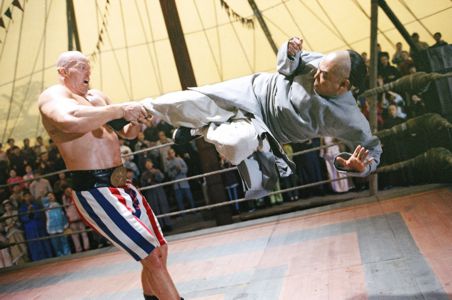
GC: Do you feel limited to martial arts and horror movies now in America?
RY: Let’s put it this way. I’m not trying to be arrogant or something, but I have no fear of tackling any genre because I love watching all genre movies. That’s why – like I said earlier – I go in like the audience. All the choices I make, I think, “Does that scene work for me as the audience? Would I get frightened? Would I get scared? Would I get high watching that? Would I get excited watching those action scenes?” As the audience, I think if I’ve seen it done before, let’s do something different. For me, I really don’t care what genre. As long as the story and characters intrigue me, I know I can do it. That’s why (if) you look at my career, I’ve done everything. I’ve done comedy. I’ve done love stories, like THE PHANTOM LOVER. I’ve done wuxia films – like the BRIDE WITH WHITE HAIR. Now I’ve done a true martial arts movie with Jet Li. Maybe next time I should do a Western! (laughs)
GC: Chucky versus Brokeback Mountain?
Written by Dr. Craig Reid for KUNGFUMAGAZINE.COM
© COPYRIGHT KUNGFUMAGAZINE.COM, ALL RIGHTS RESERVED.
All other uses contact us at gene@kungfumagazine.com.





